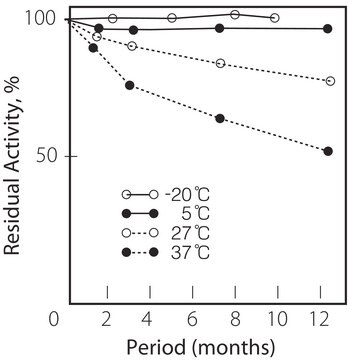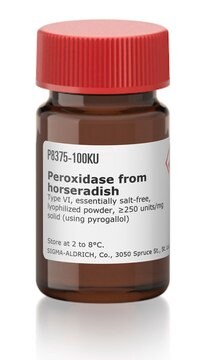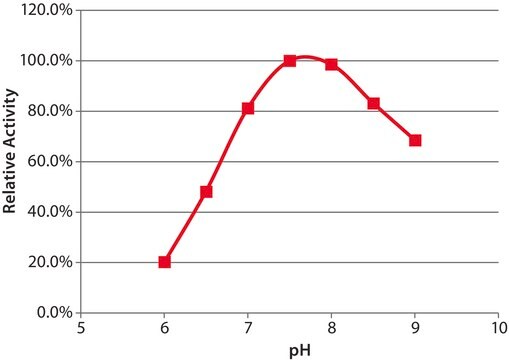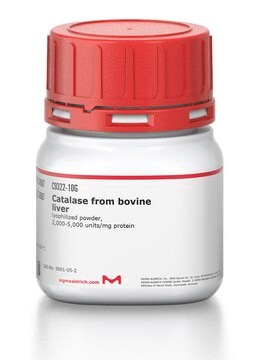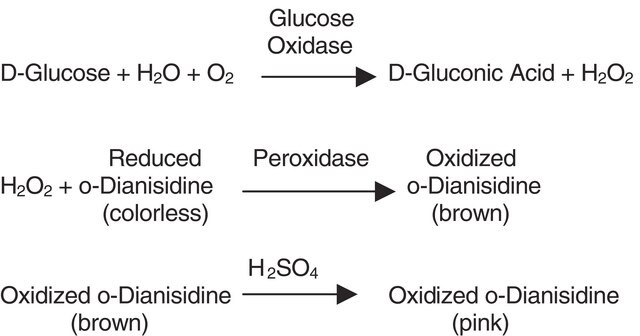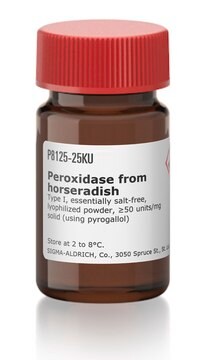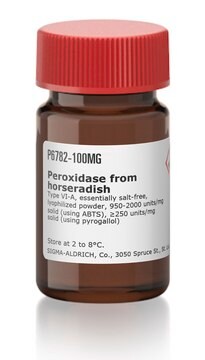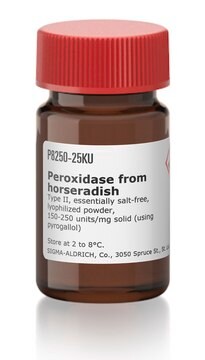C4405
Choline Oxidase from Arthrobacter globiformis
lyophilized powder, 8-20 units/mg solid
Sinônimo(s):
Choline: oxygen 1-oxidoreductase
Faça loginpara ver os preços organizacionais e de contrato
About This Item
Produtos recomendados
forma
lyophilized powder
Nível de qualidade
atividade específica
8-20 units/mg solid
peso molecular
71 kDa by SDS-PAGE
83 kDa by gel filtration
temperatura de armazenamento
−20°C
Descrição geral
Research area: Cell signaling. Choline oxidaseis a flavoprotein and belongs to the glucose methanol choline(GMC)-oxidoreductase family.
Aplicação
Choline Oxidase from Arthrobacter globiformis has been used:
- for enzymatic determination of choline (Cho) and phosphocholine (P-Cho)
- in sphingomyelin assay to determine the concentration of sphingomyelin by measuring free choline
- in enzyme coating for the fully-assembled recording device for electrochemical measurements
Choline oxidase from Sigma has been used in the enzymatic determination of choline in milk using a flow injection analysis (FIA) system with potentiometric detection.Choline oxidase from Arthrobacterglobiformis is suitable for the preparation of amperometric biosensors.
Ações bioquímicas/fisiológicas
Choline oxidase catalyzes the four-electron oxidation of choline to glycine-betaine, with betaine-aldehyde as intermediate and molecular oxygen as primary electron acceptor. The enzyme can also accept betaine-aldehyde as a substrate. This allows the investigation of the reaction mechanism for the conversion of choline to the aldehyde intermediate and of betaine-aldehyde to glycine-betaine. The enzyme is a flavoprotein with a molecular weight of approximately 83,000 Da according to gel filtration or approximately 71,000 Da according to SDS gel electrophoresis. The optimum pH is found to be around pH 7.5 and the isoelectric point (pI) around pH 4.5.
Definição da unidade
One unit will form 1 μmole of H2O2 with oxidation of 1 μmole of choline to betaine aldehyde per min at pH 8.0 at 37 °C. Note: During the conversion of choline to betaine by choline oxidase, 2 μmoles of H2O2 are produced for every μmole of choline.
produto relacionado
Nº do produto
Descrição
Preços
Palavra indicadora
Danger
Frases de perigo
Declarações de precaução
Classificações de perigo
Resp. Sens. 1
Código de classe de armazenamento
11 - Combustible Solids
Classe de risco de água (WGK)
WGK 3
Ponto de fulgor (°F)
Not applicable
Ponto de fulgor (°C)
Not applicable
Equipamento de proteção individual
Eyeshields, Gloves, type N95 (US)
Certificados de análise (COA)
Busque Certificados de análise (COA) digitando o Número do Lote do produto. Os números de lote e remessa podem ser encontrados no rótulo de um produto após a palavra “Lot” ou “Batch”.
Já possui este produto?
Encontre a documentação dos produtos que você adquiriu recentemente na biblioteca de documentos.
Os clientes também visualizaram
A multi-site array for combined local electrochemistry and electrophysiology in the non-human primate brain
Disney AA, et al.
Journal of Neuroscience Methods, 255, 29-37 (2015)
Choline import into chloroplasts limits glycine betaine synthesis in tobacco: analysis of plants engineered with a chloroplastic or a cytosolic pathway
Nuccio ML, et al.
Metabolic engineering, 2(4), 300-311 (2000)
Shihua Hou et al.
Biosensors & bioelectronics, 33(1), 44-49 (2012-01-11)
A novel acetylcholinesterase (AChE)/choline oxidase (ChOx) bienzyme amperometric acetylcholine biosensor based on gold nanoparticles (AuNPs) and multi-walled carbon nanotubes (MWCNTs) has been successfully developed by self-assembly process in combination of sol-gel technique. A thiolated aqueous silica sol containing MWCNTs and
Giovanni Gadda
Biochimica et biophysica acta, 1646(1-2), 112-118 (2003-03-15)
Choline oxidase catalyzes the four-electron oxidation of choline to glycine-betaine, with betaine-aldehyde as intermediate and molecular oxygen as primary electron acceptor. The enzyme is capable of accepting betaine-aldehyde as a substrate, allowing the investigation of the reaction mechanism for both
Shengyuan Deng et al.
Biosensors & bioelectronics, 26(11), 4552-4558 (2011-06-10)
A signal amplification system for electrochemiluminescence (ECL) of quantum dots (QDs) was developed by using electrochemically reduced graphene oxide (ERGO) to construct a nanobiosensing platform. Due to the structural defects of GO, the ECL emission of QDs coated on GO
Nossa equipe de cientistas tem experiência em todas as áreas de pesquisa, incluindo Life Sciences, ciência de materiais, síntese química, cromatografia, química analítica e muitas outras.
Entre em contato com a assistência técnica